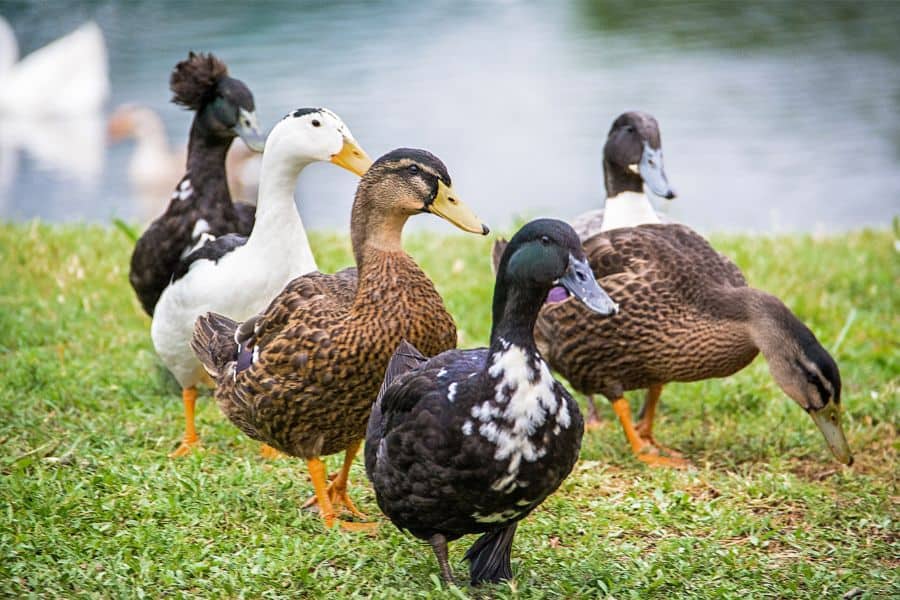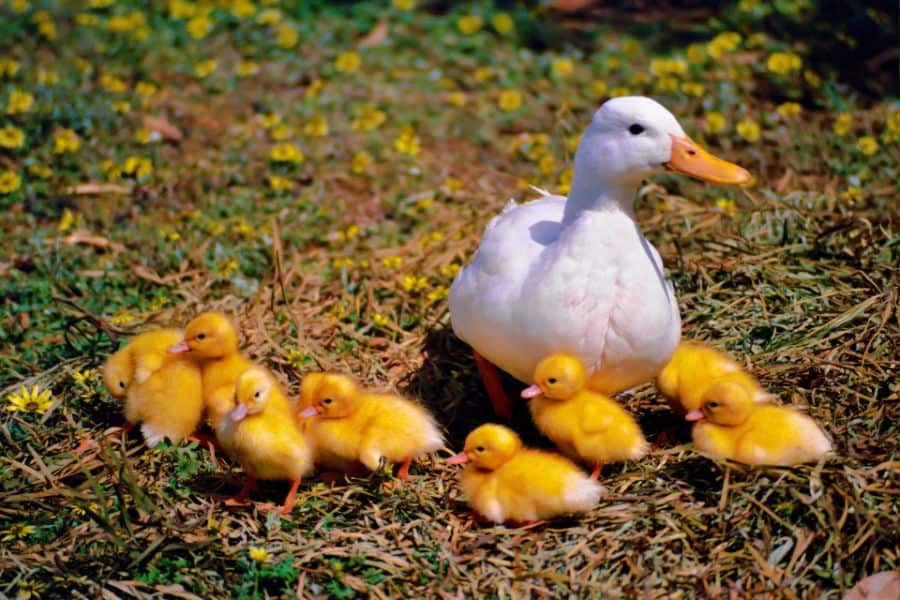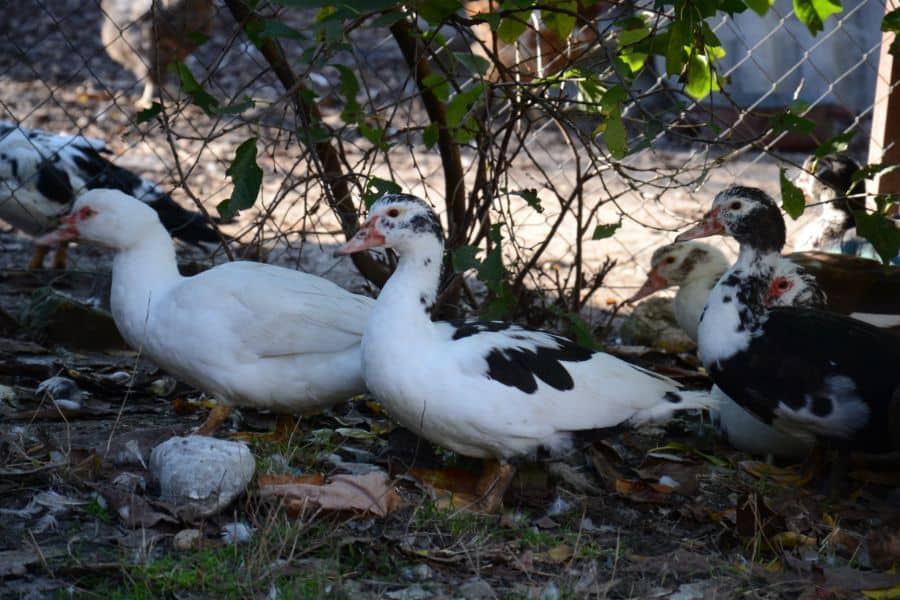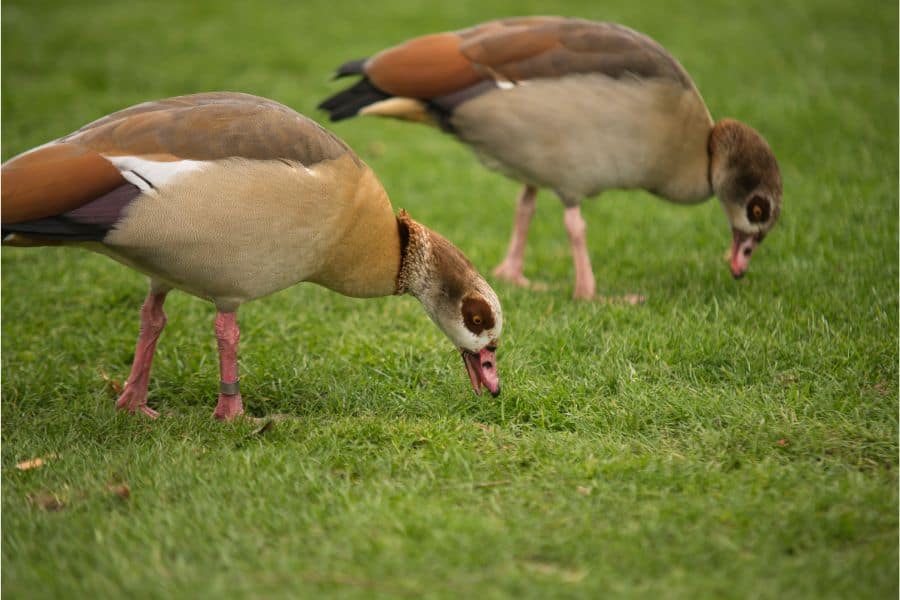Are you looking to keep ducks as pets?
Duck domestication isn’t something new. In fact, these birds were domesticated 4000 BC by the Europeans, Egyptians, and Chinese. But ducks were raised for the sole purpose of meat and egg production.
Today, however, ducks have taken a more centered role as pets in most households worldwide. All thanks to their cute faces, little waddles, and iconic quacks.
But do these birds truly make good pets?
Like any other pet, keeping ducks as pets comes with certain benefits, responsibilities, and commitments. Once you’ve understood these, you can decide whether to get a duck.
Fortunately, this post dives into the various aspects of raising ducks as pets by exploring their characteristics, benefits, and challenges. And on top of that, we’ve presented you with a chart of different duck breed you can choose from when searching for the ideal pet.
So, let’s dive in!
Characteristics of Ducks
It’s almost impossible to describe ducks because many breeds exist, each with unique characteristics and traits. Generally, ducks possess an elongated broad body, rounded head, and slightly flattened bill.
As for their sizes, colors, and temperaments, duck breeds show significant variations.
That said, ducks capture the hearts of farmers and animal enthusiasts because of their comical and talkative nature, as well as their playful antics.
While ducks can live on land, they have a strong affinity for water. It seems like God designed them to enjoy the best of both worlds; land and aquatic life.
And it gets better…
Ducks are not only adorable but friendly and approachable. This personality makes them ideal pets for families with kids and other pets.
Let’s not also forget that ducks are clever. Case in point, ducklings can outperform smart animals in specific aspects of reasoning. In fact, these fuzzballs comprehend and remember concepts like “same” and “different” with no training.
Here are nine facts you probably didn’t know about these feathered friends:
- Ducks are outgoing and social birds: They are most comfortable when in a larger group of other ducks.
- Ducks are well adapted to land, water, and air environments: They have waxy-coated feathers which help keep them warm and dry. Besides, they can swim comfortably in chilly water since they lack nerves on their feet, and the blood vessels are close together. This way, they don’t lose heat fast.
- Ducklings communicate before hatching: Ducklings learn to communicate with each other while still in their eggs so that they hatch at the same time. After hatching, they walk and swim close behind their mothers for protection from predators.
- Ducks have great vision than humans: Their eyes allow them to see finer details concurrently and in sharp focus. They can move each eye independently, can see 340 degrees around, and sleep with one eye open, watching out for predators. Isn’t that amazing?
- Most ducks have seasonal monogamous breeding: They pair for a single mating season. The breeding season involves calls, colorful feather displays, and dances as males try to woo females. They seek new mates during each breeding season and choose the strongest and healthiest mate to pass their genes to their new generation.
- Duckbills are sensitive and have touch receptors that help them search for food in muddy waters.
- Ducks are good swimmers: Their webbed feet act as paddles, allowing them to glide gracefully across water bodies like lakes, streams, and ponds. Additionally, their waterproof feathers keep them dry and help them tolerate cold water.
- Ducks are omnivorous: They feed on diverse foods, including small fish, worms, insects, aquatic plants, salamanders, grass, fruits, seeds, etc.
Duck Breeds to Keep as Pets
| Breed | Description | Weight | Egg production(annually) | Personality traits |
| The Mallard | One of North America’s most popular pets. The males tend to have beautiful plumage that attracts females during breeding seasons. | 2.9 pounds (1.3 kg) | 60-140 | Adaptable, hardy |
| Pekin | Gorgeous ducks with fluffy white plumage, yellowish-orange bills, and orange legs. | 7–9 lb (3–4 kg) | Approximately 200 | Calm, friendly, gentle, easily tamed |
| Khaki Campbell | Profillic egg layers are very fertile and one of the most popular duck breeds for meat production. | 3.5-4.5 pounds (1.6-2 kg). | 250-340 | Friendly, active forager |
| Call Duck | Versatile and smallest domesticated duck. They are social, talkative, and have inquisitive behavior. | 1.1–1.5 lbs.(500–700 grams) | 25-75, | Friendly and spunky attitude. |
| Indian Runner | They are known for their striking and charming appearance. Excellent foragers and egg layers. | 3-5 pounds (1.3-2.3 kg) | Approximately 300 | Trainable and friendly. However, these bird panic and get nervous easily when in potential danger. |
| Muscovy | The largest duck breed | Up to 9 pounds(4.11kg) | 60-120 | Independent, quiet, great for pest control |
| Cayuga | They have distinctive blue, black, and green plumage. They are easily tamed and make pleasant backyard companions. | 5-7 pounds (2.2-3.1kg) | 100-150 | Calm and docile |
Reasons For Keeping Ducks as Pets
If you’ve seen a duck before, chances are you were intrigued by how it waddled, moving its body from side to side. In a way, ducks look clumsy when they walk, but that’s the charm of it.
But wait, there’s more…
First, ducks offer companionship. Their friendly disposition and social nature allow them to form strong bonds with their owners. Of course, that’s only possible if you feed and take good care of them.
As a fact, if you do these, some breeds might even allow you to cuddle and pet them. You will also get the front to sit to their playful antics like waddling around comically, chasing after bugs, and splashing water.
Apart from companionship and entertainment value, here are other reasons you should get a duck as a pet:
- Egg production: Eggs remain one of the primary reasons for keeping ducks as pets. Duck eggs are healthy and nutritious and sometimes flavored, depending on your ducks’ diet. Some breeds even produce eggs all year round when provided with the best conditions to thrive.
- Pest control: If you are an avid gardener, you will love to have ducks as pets. These beautiful birds gobble up nearly everything, including the pests that terrorize your plants. With a few ducks around, you don’t need to invest in expensive pesticides. Release your pets into your garden and let them take care of those pesky aphids, beetles, grasshoppers, crickets, among others.
- Lawn maintenance: It’s futile to grow anything in your yard because ducks will eat them, right? Although this is not far from the truth, ducks might prove more beneficial to your yard than you might think. Yes, they eat and trample the grass and dig small holes in your lawn to find worms. However, they don’t pull the grass by the roots or scratch like chickens. As a fact, they will get rid of unwanted grass, weeds, and debris, leaving your lawn healthy.
- Meat production: Duck meat is palatable. It has high fat, protein, and iron content and has a juicy flavor compared to other poultry meat.
- Fertilizer: Ducks tend to poop everywhere they forage. They lack sphincter muscles and hence can’t control their bowel movements. And thanks to their diverse and healthy diets, they can produce the perfect fertilizer for your crops and plants.
- Feathers: Like geese, duck feathers can create pillows, warm liners, and many more. The down feathers (closest to the skin) offer the softest texture.
Challenges of Keeping Ducks as Pets
Messy
The loveliness of ducks can wear off pretty fast once you realize how dirty they can get. Their droppings are large, messy, and frequent and happen literally anywhere.
And when you confine or keep them in a small space, they’ll tread the poop down and mash it. You’ll even think they are doing it on purpose to get your reaction! They splash water out of the kiddy pool and make a mess of it.
Noisy
Ducks are loud, especially if you keep them in a confined space for too long. They can become bored or agitated and begin to quack endlessly. You don’t want this because they can disturb your neighbors, particularly if you live in urban or suburban areas.
High Maintenance
Ducks require lots of fresh water, which they mess up frequently. Frequent cleanup is required with ducks to prevent infections and illnesses.
The bedding in the coop or house needs to be replaced or removed weekly to prevent bacteria, mildew, or mold buildup.
Commitment and Care of Pet Ducks
A healthy and well-cared-for pet duck can live up to 15 years. But the exact lifespan of ducks depends on the breed you pick since some have longer or shorter lifespans.
Feed Requirements
Ducks are omnivorous and often feed on various foods, including greens, seeds, slugs, fruits, small fish, and snails.
However, pet ducks require an appropriate amount of high-quality feed at the right time to maintain good health and stay happy. A mature duck consumes approximately 225 grams of feed a day.
Avoid feeding your ducks with starchy foods such as bread and pasta. Instead, allow them to free range in the yard.
You can also supplement their diet with commercial feeds. But first, conduct research for the best feed that offers your birds all the essential minerals, vitamins, and other nutrients they require.
Social Needs
- Duck Coop
Ducks are best kept outdoors. Their house should be raised off the ground, with a hardware mesh securely attached to the bottom to provide drainage and ventilation. It should be completely enclosed and predator-proof.
Consider plenty of floor space with waterproof flooring and bedding like pine shapings. You can use tarps, rubberized or linoleum coating to protect your floors from water damage. Your ducks also need a stable, wide walk-up ramp to get to the house.
- Duck Yard
Provide an enclosed yard free of predators for the ducks to play when not in the coop. You can surround it with an electric fence and cover it with hawk-netting
- Swimming Tub
Duck lives revolve around water. They love to swim, bathe, splash, and drink. Provide a swimming tub with enough room and change the water regularly. Ensure that the ducks can get in and out of the tub quickly, especially if you are raising ducklings.
Veterinary Care
Before getting a pet duck, locate a veterinarian experienced in treating ducks within your locality. And once you get your pet ducks home, ensure you take them to the veterinarian to be checked, vaccinated, and treated for any injury or sickness. After that, you can schedule annual checkups.
Ducks have a reputation for being clumsy and they usually trip over things, hence they can get injured. And the worst part? They often fall victim to diseases and illnesses, such as respiratory infections, toxic reactions, and intestinal diseases.
Keep a watchful eye on sickness or injuries such as limping, lethargy, decreased or loss of appetite, swollen foot sores, and any other changes in their behavior.
Is a Duck the Right Pet for You?
The idea of keeping ducks as pets comes with a blend of messy lows and joyous highs. They’re charming, full of personality, brilliant, and may turn your life into gratifying feathery cuddles and spin of quacking.
It’s hard to resist these cuddly ducklings, which are perfect for kids. Furthermore, they have a natural charisma, and you can train them to sit on your laps, play games, and perform tricks.
These little waddlers make awesome backyard pets if you have the appropriate environment and space to keep them.
Nevertheless, they require lots of care, resources, and effort to keep them happy and healthy. If you plan to keep ducks as house pets, remember that they love the outdoors and are unsuitable for indoor lifestyles.
Also Read:
Conclusion
Ducks are not your conventional pets, which raises a lot of concerns, like how do I care for them, what should I feed them, and so on. But like any other pet, ducks come with their own set of benefits, such as companionship, egg and meat supply, and pest control.
These pets are also not without challenges. They can get quite messy and noisy. Ducks also require constant care to prevent infections and diseases.
All in all, before you opt for ducks as pets, familiarize yourself with every aspect of these feathery animals to provide them with the best care possible.




